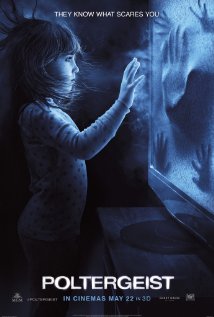Review: Poltergeist
 On Thursday, I saw the Gil Kenan (Monster House, City of Ember)-directed movie Poltergeist, a remake of Tobe Hooper's 1982 masterpiece. David Lindsay-Abaire (Oz the Great and Powerful, Rise of the Guardians) re-adapted the script from the original film, which had been conceived and co-written by Steven Spielberg. I expected the new movie to completely suck, so I'm surprised to disagree with many of my fellows and say that it's not great, but it's sort of okay.
On Thursday, I saw the Gil Kenan (Monster House, City of Ember)-directed movie Poltergeist, a remake of Tobe Hooper's 1982 masterpiece. David Lindsay-Abaire (Oz the Great and Powerful, Rise of the Guardians) re-adapted the script from the original film, which had been conceived and co-written by Steven Spielberg. I expected the new movie to completely suck, so I'm surprised to disagree with many of my fellows and say that it's not great, but it's sort of okay.
If you haven't watched the 1982 Poltergeist, which stars Craig T. Nelson, JoBeth Williams and Zelda Rubinstein, do yourself a favor and stop reading now. Find it on disc or online. It's the apex of family horror films and the greatest haunted house movie ever made, so it's little surprise Kenan would be chosen to direct the remake, based on his earlier Monster House. Hooper's original figures heavily in this review, and you should be familiar with the story before you continue.
The differences in this version are immediately obvious. It's 21 minutes shorter, and everything feels rushed. Hooper's version was a slow burn that began with odd, whimsical events and descended into terrifying madness. The script Kenan directed jumps immediately into malicious attacks, before the family even moves into the house.
Before I dig into the weaker points of the new Poltergeist, I want to address the things I liked. I enjoyed Sam Rockwell more in this role than Craig T. Nelson in the original. Rockwell is more likable, more easygoing and more fallible. His chemistry with Rosemarie DeWitt is spot-on, and the kids are phenomenal. They play a larger role in this script, and they are all more believable characters. (Though I wonder why bother renaming them all?) Kenan uses light and shadow to great effect, and he doesn't shy away from the use of modern technology, so it's clear he's not trying to reproduce the original.
There are a few things I feel were missteps. While 3D is de rigueur for most studio releases lately, a number of shots are staged as if to specifically prove that you're seeing the film in 3D. A car placed immediately in the foreground of a wide shot of the house, early in the film, was annoying and distracting. Kenan cut the scene I found scariest in Hooper's version, but he spends a large portion of the film taking the camera into the "other side" breaking the rule of "don't show, tell."
Let's talk about the elephant in the room. There is no getting around the loss of Tangina. It's impossible to reproduce the performance of the irreplaceable Zelda Rubinstein as the psychic medium who arrives to help a struggling family and finds herself in the middle of her greatest battle. So the character was rethought, and Jared Harris (Mad Men) was cast as Carrigan Burke, a TV exorcist. Harris is a great performer, but as the role is written, he's merely going through the motions. While his character is actually psychically talented, his reality-show persona cheapens the character. He is introduced early in the film through his TV show, and that removes any air of mystery about him. The result is that his entrance has no gravitas. As the family begs him to "say the line" they shed their desperation as victims of a terrifying paranormal attack who should be extremely thankful to their new friends. Instead, they become like his normal audience, star-struck, voracious for a touch of celebrity, uncouth. Burke never appears to be at risk from any of the events on screen, and there is no reason to care if he did.
The original Poltergeist was if anything a commentary on the risks of unchecked development that swept the country during the real-estate boom of the early 80s, which went bust as the S&L scandal came to light. This Poltergeist is commentary on today's American family post-great recession, obsessed with technology, a TV in every room, credit cards maxed out, unsure what to do next to keep the lights on.
The Freeling family in the 1982 Poltergeist was on the rise, moving up in the world and full of hope. This poltergeist intrusion attacks the Bowen family as they are downsizing to a poorer neighborhood after corporate layoffs. It beats a family that is already down and hopeless, The American Dream gone sour vs. The American Dream that was already sour and getting worse.
On its own, Kenan's Poltergeist would be a passably good movie, the kind of scary funhouse ride that a younger audience could really sink its teeth into while their parents were likewise engaged and entertained, much like Monster House. However, as a remake, it is already taking a huge beating from fans and critics. I'm inclined to give it more leeway, because nothing without Zelda Rubenstein could compare. Kenan makes a great effort, you can see his team really tried to do a great job, but for all his efforts, he can't reproduce the mad genius of Tobe Hooper.

